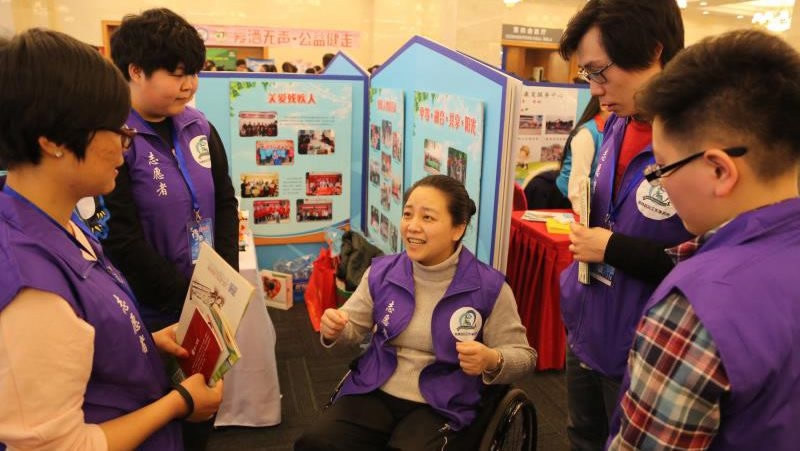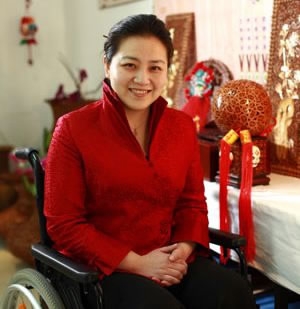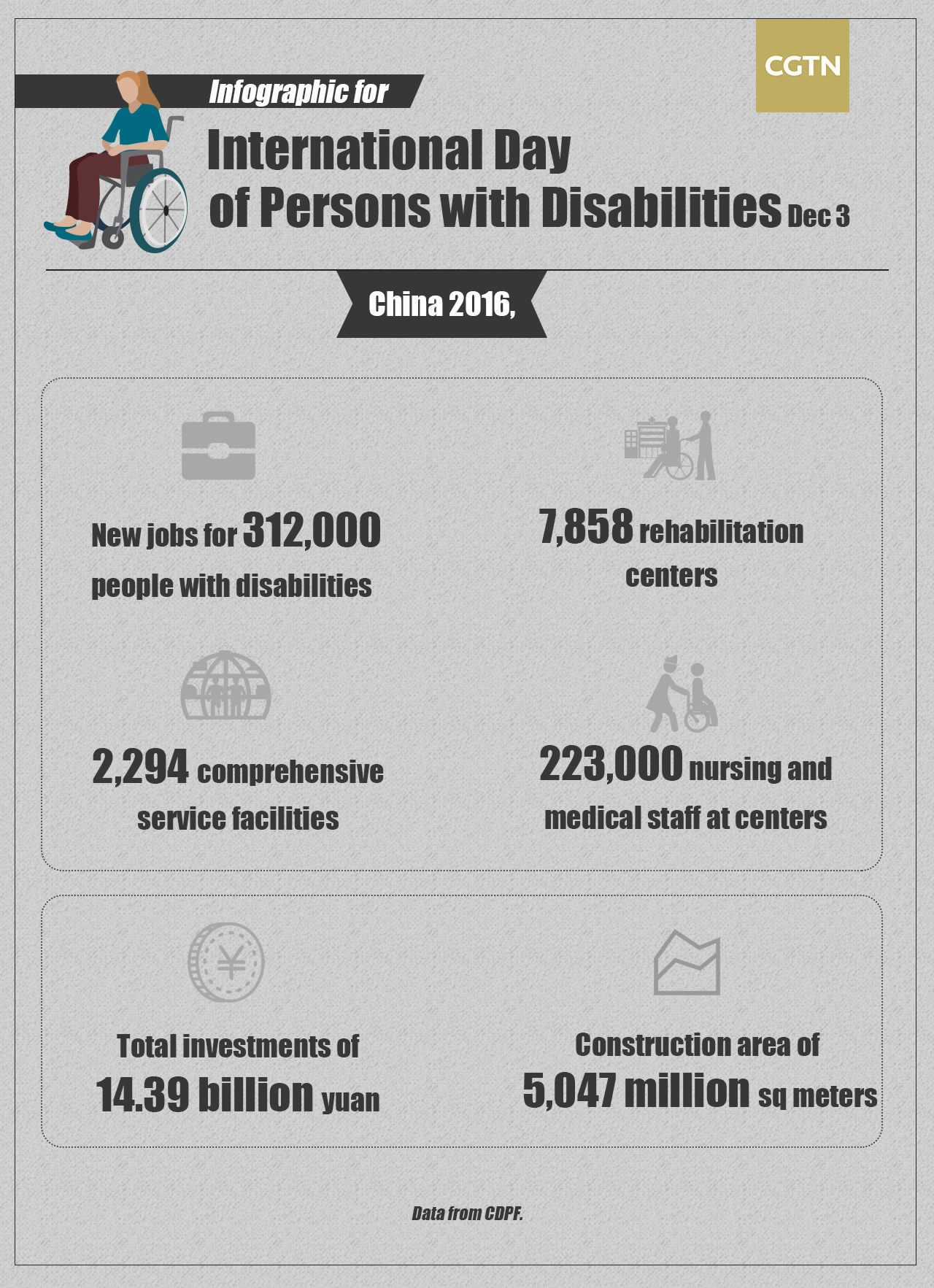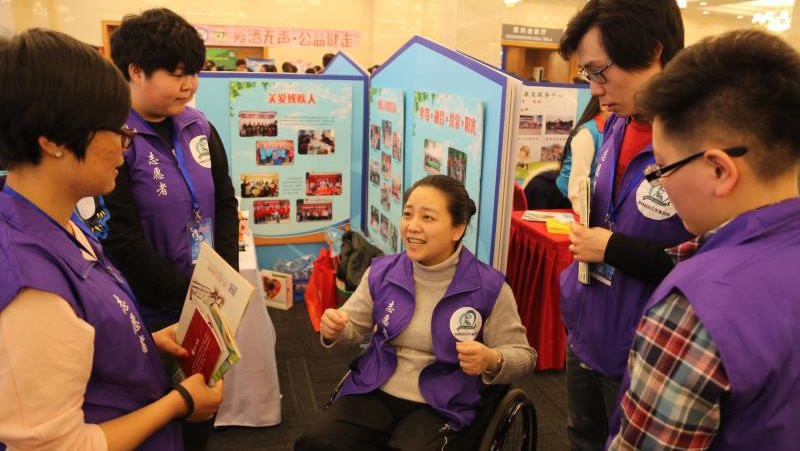
China
15:26, 03-Dec-2017
Beijing disability chief sees bright future in ‘people-centered’ China
Nick Yates

January 13, 2003 was the day Li Nan’s life changed forever, when the prize-winning amateur dancer was left paraplegic in a car accident and facing a tough road to recovery in a country where conditions have not always been easy for disabled people.
She has not only survived but prospered, becoming the head of the main Beijing branch of the China Disabled Persons’ Federation (CDPF) and helping secure huge improvements in how Chinese people with disabilities are provided for and perceived. As the world marks International Day of Persons with Disabilities on Sunday, Li can reflect on how life has changed for her and China’s population of 85 million people with disabilities.

Li Nan was left paraplegic in a car accident in 2003. / CDPF Photo
Li Nan was left paraplegic in a car accident in 2003. / CDPF Photo
Promoting the cause
The UN-led International Day is all about raising awareness of the rights of disabled people and the situations they face. The everyday challenges of living with a disability are something a lot of able-bodied people may not realize. “The normal physical aspects of daily life that healthy people take for granted are difficult for us,” Li said.
She was 26 at the time of the accident. Li first struggled with the mental adjustment of accepting new limitations, she said, and then she had to adjust physically to them. “Before I became disabled, I went to the bathroom whenever I wanted. But now I have an incontinence problem. So I have had to change my diet and use disposable hygiene products.
“After I was injured, I had to learn how to tuck myself into a wheelchair from the bed, and how to deal with my urine problems. These are the real situations I encountered.”
People unfortunate enough to suffer serious injury would get a lot more help today in China, as the country has put more resources into treatment. As of the end of 2016, there were 7,858 rehabilitation centers across China, 3,049 of them managed by the CDPF. Some 223,000 nurses and medical experts staff all the centers, according to the latest official statistics.

/CGTN graphic
/CGTN graphic
Opportunities for all
Established in 1988 to provide services to and represent the interests of disabled people, the CDPF has been encouraged by the government’s growing support. Policies introduced over the past two years have committed to providing subsidies for disabled people, employment protection and greater accessibility.
Particularly exciting for Li was the recent Communist Party of China National Congress promising a “people-centered society” with opportunities for all, including through developing careers for disabled people and special education for children with disabilities.
“The current environment in China is much better for people with disabilities,” Li said. “The building of this new culture will give disabled people equal opportunities to participate in society.”
For the CDPF, one of the most important improvements is to accessibility. “We [the CDPF] pay a lot of attention to changes in the physical environment – ramps, barrier-free toilets, braille, facilities for deaf and blind people, so that we can better integrate into normal life,” said Li.
“The CDPF has actively advocated for accessibility improvements for years. This remodeling is the first step in enabling disabled people to get out of their homes. For example, in my community, after a home-improvement project, I have a ramp that makes it a lot easier to go outside.
“For deaf people, there are flashing doorbells so if the homeowner cannot hear the bell, they will see the doorbell flashing, so they know there are guests coming. Home improvements like these have given the disabled community a great deal of convenience.”
Li pointed to Chinese institutions increasingly recognizing the need to cater for people with disabilities. For example, the prestigious Tsinghua University reportedly provided free accommodation for a student with spina bifida and his mother who gave up her job to support him through university.

Li Nan (center) leads Beijing’s branch of the China Disabled Persons' Federation in its advocacy work. / CDPF Photo
Li Nan (center) leads Beijing’s branch of the China Disabled Persons' Federation in its advocacy work. / CDPF Photo
Gainfully employed
Another important factor in the well-being of disabled people is employment, as Li knows from her own experience. She described hospital rehab as “a state of having no work and nothing to do. When I was able to return to my family, the first thing I could think of was to go back to work.”
Li, the secretary of her university’s Communist Youth League while studying, was well suited to a job with the CDPF. But she said there are increasing opportunities for disabled people in all fields of employment. “Like the CDPF and social organizations, many enterprises and institutions now have policies that can meet the needs of people with disabilities to find a job.
“Employing persons with disabilities is practically without problems as long as they are willing to work.”
With a government campaign encouraging mass entrepreneurship through preferential policies like tax breaks, it is also easier than ever for disabled Chinese people to start their own businesses, Li pointed out.
Working is crucial to disabled people achieving self-reliance and feeling they are of value, she said. “If employed, we feel we are useful and making a contribution to our families and society. Able-bodied people cannot know how important this feeling is to people with disabilities.”
In 2016, there were 312,000 new employments of disabled people, according to the CDPF.
In the 15 years since Li’s car accident, “we have seen so much development in the careers of disabled people, improvement in special education and our pension security,” she said. “People traditionally regarded as being in a disadvantaged group are getting more and more power. As Chinese society develops, our lives will get better and better.”
(Wang Jia also contributed to this story)
1km

SITEMAP
Copyright © 2018 CGTN. Beijing ICP prepared NO.16065310-3
Copyright © 2018 CGTN. Beijing ICP prepared NO.16065310-3